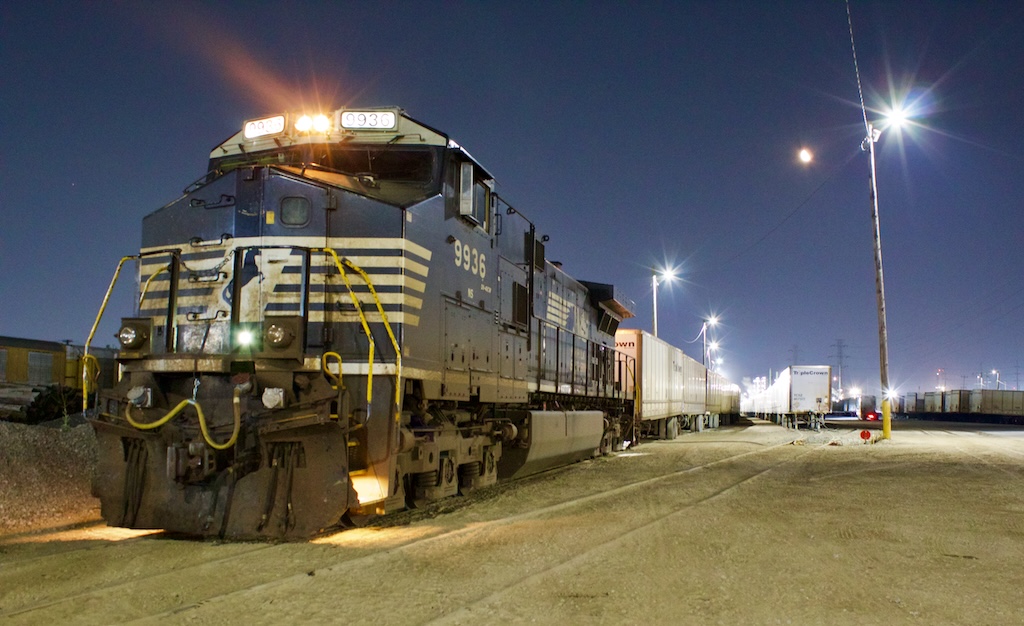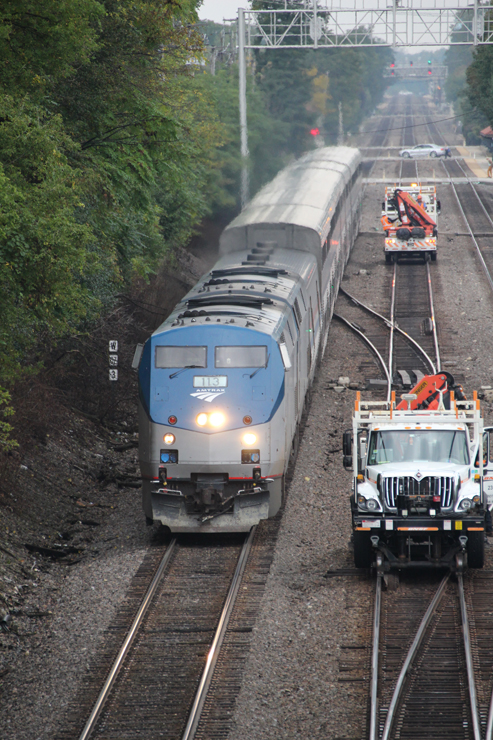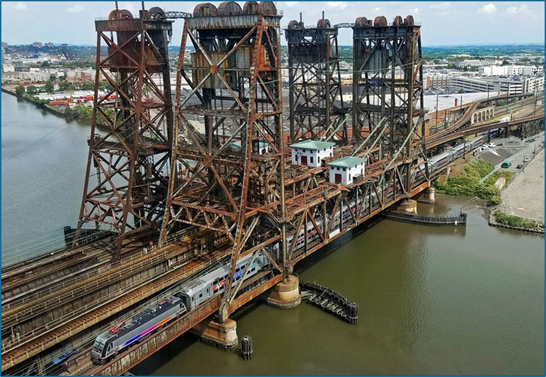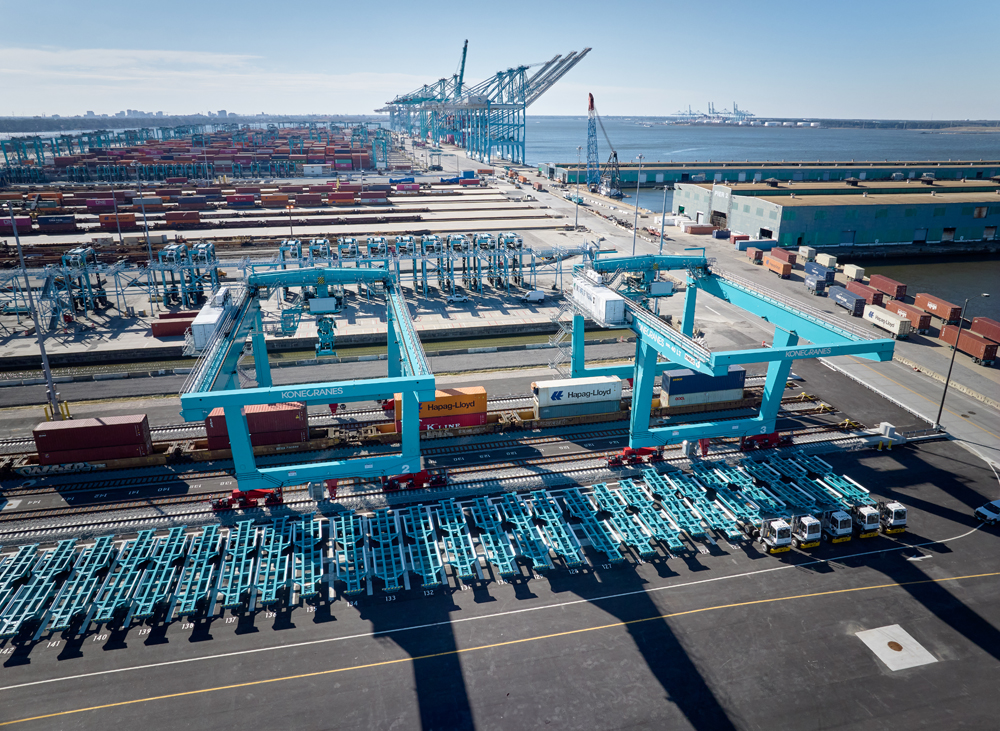
Several freight rail business developments did not rank among our Top 10 stories of the year — but were still important in the grand scheme of things. They include:
New Southeast-Mexico corridor
CSX and Canadian Pacific Kansas City on Dec. 1 began service over the former Meridian & Bigbee short line that serves as a shortcut linking the Southeast with Texas and Mexico.
The Surface Transportation Board in October approved the Class I railroads’ plans to acquire and operate portions of the Genesee & Wyoming short line, which filled a gap between the CSX system near Montgomery, Ala., and CPKC at Meridian, Miss. The two railroads officially interchange at Myrtlewood, Ala.
The new trains allow Schneider, a joint customer of CPKC and CSX, to offer its first intermodal service between the Southeast and Mexico, which is a prime route for auto parts shipments. Schneider believes the volume conversion opportunities from highways in the Southeast-Mexico and Southeast-Dallas lanes are twice as big as the Chicago-Mexico service currently running on CPKC hotshots 180 and 181.
The CSX-CPKC interline trains also carry finished vehicles and forest products traffic, some of which used to move via the New Orleans gateway.
Labor developments

CSX, BNSF Railway, Norfolk Southern, and Canadian National reached tentative agreements with a number of their labor unions months ahead of the start of the U.S. national contract process.
In an August interview, CSX CEO Joe Hinrichs said the tentative agreements were the result of a mutual desire to avoid a replay of the contentious and prolonged round of national bargaining that began in 2019 and concluded with a contract Congress imposed in December 2022.
National negotiations, conducted through the National Carriers Conference Committee, sometimes make it more difficult to reach contract deals, Hinrichs said. Issues like work rules that are unique to each railroad as well as railroads having their own competing priorities can stand in the way of consensus. But national contract talks are not a bad thing and are certainly not dead. “I just think we have a very unique situation right now, driven largely by what happened last time,” he said.
Union Pacific was talking with its unions about work rule modernization and scheduling for engineers and conductors and did not reach any tentative deals with its unions prior to the Nov. 1 date when contracts could first be amended.
The tentative and ratified contract deals followed a pattern that includes wage increases of 18.8% over five years and improvements to health care coverage and vacation time.
In Canada, CN and Canadian Pacific Kansas City remained far apart on the terms of a new contract with the Teamsters Canada Rail Conference that represents engineers and conductors. After CPKC and CN locked out their unionized workers in August, the Canadian government issued a back to work order in less than 18 hours. Ottawa also sent the railway contract talks to binding arbitration.
West Coast container surge
Labor disruptions – or the potential for them – helped drive a dramatic increase in container shipments through West Coast U.S. ports, particularly at Los Angeles and Long Beach, Calif.
Importers gravitated toward the West Coast amid an anticipated strike at ports on the U.S. East and Gulf Coasts. Ultimately, dockworkers walked off the job for two days in October before agreeing to resume contract talks.
BNSF Railway and Union Pacific both handled international container surges. BNSF in the first week of December set a new annual on-dock container record at the ports of Los Angeles and Long Beach when it surpassed 1.5 million lifts for the year. UP’s third-quarter international intermodal volume was up 33% year over year.
Meanwhile, labor disruptions briefly shut down Canadian ports in November. Ports in British Columbia and Quebec were affected by lockouts and strikes. The disruptions hurt CN and CPKC international intermodal volume and sent additional traffic to U.S. ports for cargo that was bound for Chicago and previously relied on Canadian ports.
STB shines spotlight on growth challenges

The Surface Transportation Board in September held a two-day hearing on the lack of carload growth in the U.S.
The Class I railroads touted their growth plans and improvements in service and resiliency. Better service, along with more shipper-friendly technology systems, should lead to volume growth, the railroads said. They also noted that they are cooperating more closely than ever with short lines.
Rail customers told regulators that they want to put more freight on the railroads. But unreliable service, inflexible rates, and a lack of rail competition means that they are instead sending more of their business to trucks.
Labor leaders told the STB that railroad staffing levels are a barrier to volume growth.
Consultants and analysts told the board that rail traffic has been sinking because the Class I railroads have been exploiting their pricing power, provide unreliable service that doesn’t fit modern supply chains, and are captive to a Wall Street that has a short-term focus and does not believe railroads can grow.
Sunset for RoadRailer service
Norfolk Southern in August ran its last Triple Crown RoadRailer trains. Triple Crown’s bi-modal trailers had been hauling auto parts for decades on the last RoadRailer route between Detroit and Kansas City.
NS restructured Triple Crown in 2015, scaling back its 13-terminal network to just the Detroit-K.C. lane. This year NS decided the aging equipment was at the end of its service life.
And so it shifted the freight into a pair of new container trains that link Toledo, Ohio, with Kansas City. It’s the first time Triple Crown has used domestic, 53-foot containers to provide door-to-door service for auto parts. NS envisions expanding the service to other intermodal lanes on its system.
Previous News Wire coverage:
STB calls hearing for Class I railroads to outline plans for growth, July 12, 2024
Norfolk Southern sets date for RoadRailer finale, Aug. 12, 2024
CSX, well before a deadline, reaches deal with three of its unions, Aug. 21, 2024
CSX CEO Joe Hinrichs: Tentative labor agreements are a sign of progress, Aug. 22, 2024
Canada’s labor minister orders arbitration to end CN, CPKC work stoppages …, Aug. 22, 2024
NS, BNSF announce tenative pacts with unions, Aug. 23, 2024
Canadian agency upholds binding arbitration order to end rail dispute, Aug. 24, 2024
Norfolk Southern’s Triple Crown RoadRailers ride off into history, Aug. 26, 2024
Hearing focuses on turning around the rail industry’s growth problem, Sept. 16, 2024
Regulators scrutinize trends on second day of rail growth hearings, Sept. 17, 2024
UP explains absence from early contract agreements with organized labor, Sept. 19, 2024
Regulators urge BNSF and Union Pacific to be prepared for West Coast container surge, Sept. 24, 2024
Union Pacific tells regulators it’s already moving record West Coast container volume, Oct. 1, 2024
Regulators approve CPKC, CSX acquisition of Meridian & Bigbee, Oct. 17, 2024
Rail industry bargaining group announces tentative agreements with two unions, Nov. 13, 2024
Schneider to launch intermodal service over new CPKC-CSX shortcut, Nov. 11, 2024
Ottawa puts end to lockouts at ports in British Columbia and Quebec, Nov. 12, 2024
BNSF sets new container volume record at Southern California ports, Dec. 9, 2024













